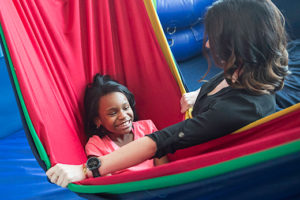How to Encourage Your Child to Talk
To help your child on a language learning journey, try these fun activities:
- Motivate your child to talk about something they enjoy (a favorite food, close relative, special toy, etc.).
- Label feelings – if your child is reaching for food, say “you are hungry” or if they’re throwing a temper tantrum, say “you are mad.” That way, they’ll learn to associate their feelings with specific words and learn how to express those feelings in the future through words instead of screams.
- Model language – if your child needs help reaching a toy, prompt them to verbally ask for help by saying “I want the toy please” or “I need help please” rather than letting them use hand signals.
- Imitate your child – make the same sounds they do and mimic their behavior during play to encourage them to imitate you, too.
- Use descriptive words – instead of “it’s time to leave for school,” say “it’s time to put on our shoes, our coats, and grab our backpacks before we walk outside to the car.”
- Take a photograph or draw a picture of a different food or activity while verbally naming what is going on in the picture. Encourage your child to draw their own picture.
- Encourage social interaction through play – your child communicates and learns through play so find games they enjoy and play those games with them.
- Nonverbal communication lays a foundation for language – exaggerate your gestures, using both your body and voice (by pointing to an item you’re talking about it, for example) to encourage your child to use more verbal communication.
- Pause for a few seconds after a question and look at your child to allow a space for your child to talk, even if they don’t take it.
- Keep track of your child’s interests. Follow along with their play and narrate what your child is doing so they come to associate actions with words.
- Simplify your language. Keep your sentences as simple as possible when talking to your child to cut down on misunderstandings.
- Consider using assistive devices (there are apps!) if your child is non-verbal to allow for some form of communication and to foster speech development and a connection between words and pictures/actions.
If you are concerned about your child’s language development, one of our speech-language pathologists would be happy to talk with you.


Eyas Landing is a therapy clinic with a mission to provide evidence-based and family-centered therapy services for children, adolescents, and their families. The primary goal is to deliver relationship-based interventions within the most natural environments and to empower families to reach their full potential. To achieve this goal, our highly educated, compassionate staff dedicates time and expertise to create experiences that maximize therapeutic outcomes. The strength, determination, and perseverance of our clients are evident as they succeed in therapy, and ultimately in their daily lives.
Eyas Landing offers a wide range of comprehensive services including Speech Therapy, Occupational Therapy, Physical Therapy, ABA Therapy, Social Work, Family Therapy, and Neuropsych testing. Services are provided throughout the Chicagoland area via Telehealth, In-Home, and in our state of the art clinic.
Want to learn more or you have a specific question? Feel free to connect with us here!



